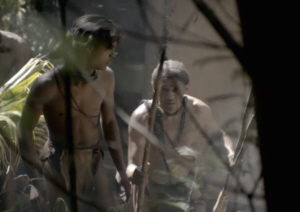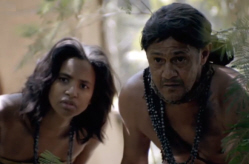Age of Extremes: Ayoreo South American Tribe
We are now, all of us, living in an age of acceleration, a frothing torrent of invention, devices, interconnectedness and smart everything. More of us on earth live longer, healthier and wealthier lives than our ancestors would have imagined possible. The Ayoreo are a people living in South America, completely untouched by modern society.
But all of this consumption hasn’t come free. We’ve ripped through rainforests like the Amazon. We’ve caused the extinction of other creatures and we’ve affected the climate. It’s hard to imagine the shock early humans would have felt if they were suddenly confronted by modern humanity.
The relentless march of progress

Except that, at the end of the 20th century, that is exactly what happened to a small group of Indians who’d lived a semi-nomadic lifestyle for thousands of years in South America.
Parojnai, Ibore and their five children were members of the Ayoreo tribe.
Parojnai “We thought that the beast with the metal skin could see us. We thought that it had seen our garden and came to eat the fruit and to eat us too.”
And of course they were quite right. The bulldozer had come to eat their land and their way of life.
Ibore “Parojnai asked me if I was scared of the stranger. I said I’m not scared. So we went to get a closer look.”
On meeting the logger Ibore tried to reassure the stranger. “There is no reason to run,” she said. “We are good people.”
They may have been separated by thousands of years of human development, but on both sides, their tastes, their needs, proved humanly familiar. Decoration, nice things, a shared humanity.

Under the layers of experience that we call progress, we’re still driven by the same instincts and desires that ruled us right at the beginning of the human story. Today we’re are armed with gadgets, computers, phones, and what do we do with them? The same shopping, gossiping, consuming and sometimes protesting that we’ve always done.
Although now there are 7 billion of us and rising rapidly. Either we manage differently, no longer devouring quite so much so fast of the earth’s natural resources, or we’ll have to shrink our numbers.
So, the decisions we make in the next 50 years may well decide our fate.

Now, Brazil is going to be one of the most important countries in the world in the century ahead. If they can get the balance between a better life and democracy without destroying the environment.. Big if, but if they can get that balance right here in Brazil, then perhaps mankind can get it right.
But getting it right must mean drawing on our past experience. What else have you got to learn from but our history, all of our history? The history of the world.
Clever Ape
Homo sapiens means “wise man”. Really? Clever, certainly. Our technical accomplishments, awesome. We understand our planet, the origins of our universe, even ourselves, as we’ve never done before, and we live in societies much less violent than most of those you’ve seen in this series. But we are still deadly dangerous, very greedy and bad at looking ahead. I’d say we’re a clever ape in a spot of bother.
Societies have faced catastrophe before and found ways through them, and there’s no reason why we can’t do the same. But at the end of this series, the only absolutely clear and safe prediction that I can give you is that the most interesting part of human history lies just ahead.
External Links
Ayoreo People - Wikipedia Page
